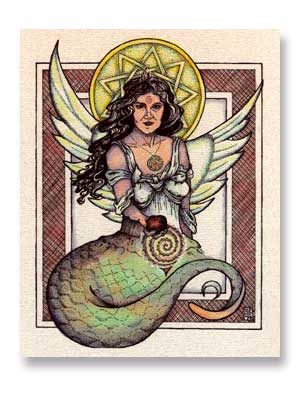"Lamia"
From digitalhumanities
In Keats' long poem, "Lamia," the shape-shifting rainbow creature, by assuming the body of a lovely young woman, has brought love and joy to a young man who abandoned philosophy to live with her in a magical hut. But as the young man and Lamia call their friends to a wedding feast, trouble arrives in the form of the young man's teacher, a philosopher-scientist, who unmasks the Lamia much as science had unmasked the rainbow as merely broken light. Lamia, who was exotic and illusionary, is revealed to be known "in the dull catalogue of common things." She shrieks, resumes her supernatural serpent-like form, and flies off. The young man dies. There is something in this tale like the unmasking of the imagination and something of the pain that Keats and other Romantics felt in the face of logical positivism, the force that was then driving science. ~Paul Jones - Educom Review, Jan/Feb 1998
John Keats (1795–1821). The Poetical Works of John Keats. 1884.
36. Lamia
Excerpt from one, really long poem.
“I was a woman, let me have once more
“A woman’s shape, and charming as before.
“I love a youth of Corinth—O the bliss!
“Give me my woman’s form, and place me where he is. 120
“Stoop, Hermes, let me breathe upon thy brow,
“And thou shalt see thy sweet nymph even now.”
The God on half-shut feathers sank serene,
She breath’d upon his eyes, and swift was seen
Of both the guarded nymph near-smiling on the green. 125
It was no dream; or say a dream it was,
Real are the dreams of Gods, and smoothly pass
Their pleasures in a long immortal dream.
One warm, flush’d moment, hovering, it might seem
Dash’d by the wood-nymph’s beauty, so he burn’d; 130
Then, lighting on the printless verdure, turn’d
To the swoon’d serpent, and with languid arm,
Delicate, put to proof the lythe Caducean charm.
So done, upon the nymph his eyes he bent,
Full of adoring tears and blandishment, 135
And towards her stept: she, like a moon in wane,
Faded before him, cower’d, nor could restrain
Her fearful sobs, self-folding like a flower
That faints into itself at evening hour:
But the God fostering her chilled hand, 140
She felt the warmth, her eyelids open’d bland,
And, like new flowers at morning song of bees,
Bloom’d, and gave up her honey to the lees.
Into the green-recessed woods they flew;
Nor grew they pale, as mortal lovers do. 145
Left to herself, the serpent now began
To change; her elfin blood in madness ran,
Her mouth foam’d, and the grass, therewith besprent,
Wither’d at dew so sweet and virulent;
Her eyes in torture fix’d, and anguish drear, 150
Hot, glaz’d, and wide, with lid-lashes all sear,
Flash’d phosphor and sharp sparks, without one cooling tear.
The colours all inflam’d throughout her train,
She writh’d about, convuls’d with scarlet pain:
A deep volcanian yellow took the place 155
Of all her milder-mooned body’s grace;
And, as the lava ravishes the mead,
Spoilt all her silver mail, and golden brede;
Made gloom of all her frecklings, streaks and bars,
Eclips’d her crescents, and lick’d up her stars: 160
So that, in moments few, she was undrest
Of all her sapphires, greens, and amethyst,
And rubious-argent: of all these bereft,
Nothing but pain and ugliness were left.
Still shone her crown; that vanish’d, also she 165
Melted and disappear’d as suddenly;
And in the air, her new voice luting soft,
Cried, “Lycius! gentle Lycius!”—Borne aloft
With the bright mists about the mountains hoar
These words dissolv’d: Crete’s forests heard no more. 170
Whither fled Lamia, now a lady bright,
A full-born beauty new and exquisite?
She fled into that valley they pass o’er
Who go to Corinth from Cenchreas’ shore;
And rested at the foot of those wild hills, 175
The rugged founts of the Peraean rills,
And of that other ridge whose barren back
Stretches, with all its mist and cloudy rack,
South-westward to Cleone. There she stood
About a young bird’s flutter from a wood, 180
Fair, on a sloping green of mossy tread,
By a clear pool, wherein she passioned
To see herself escap’d from so sore ills,
While her robes flaunted with the daffodils.
Ah, happy Lycius!—for she was a maid 185
More beautiful than ever twisted braid,
Or sigh’d, or blush’d, or on spring-flowered lea
Spread a green kirtle to the minstrelsy:
A virgin purest lipp’d, yet in the lore
Of love deep learned to the red heart’s core: 190
Not one hour old, yet of sciential brain
To unperplex bliss from its neighbour pain;
Define their pettish limits, and estrange
Their points of contact, and swift counterchange;
Intrigue with the specious chaos, and dispart 195
Its most ambiguous atoms with sure art;
As though in Cupid’s college she had spent
Sweet days a lovely graduate, still unshent,
And kept his rosy terms in idle languishment.

